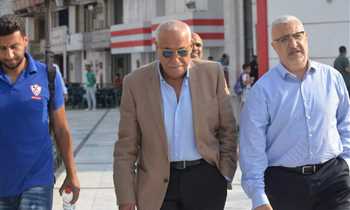
كتب : محمد سبع | الإثنين، 16 يناير 2006 - 04:21
A Good Omen .. I Think Not
The veteran coach and his players stunned Egyptian and African fans alike by clinching the fourth continental title for the Pharaohs.
Eight years later, Egypt's manager Hassan Shehata finds himself in the same situation as his predecessor ahead of the continent's top competition.
Egypt's elimination from the 2006 World Cup qualifiers was followed by mediocre performances and poor results in the build-up for the African Cup, including a home defeat to African champions Tunisia, slender victories over reserves teams of both Uganda and Senegal and finally a defeat to South Africa.
These results only reflected the flux of the national team and the absence of a stable starting line-up, which is a result of Shehata's open door policy that left most Egyptians struggling to name the first-choice team in the midst of all the chopping and changing.
In his final squad selection for the African Cup, Shehata left out a number of highly experienced Europe-based players like Mainz striker Mohamed Zidan, Feyenoord midfielder Hossam Ghaly and Konyaspor forward Ahmed Belal.
The former youth national team boss also left out a number of crowd favorites including Zamalek's Hazem Emam and veteran goalkeeper Nader Al-Sayed.
His most notorious choices included long time national team absentee Hossam Hassan and controversial defender Ibrahim Saied.
Al-Gohary had also taken a chance on Hassan in 1998, back when the former Ahli and Zamalek ace was 31-years-old, despite coming under attack from fans and critics alike.
With Hassan now approaching 40 years of age, Shehata's gamble on the Masri skipper seems less justified given the player's pace, volatile temper and lack of international participation.
But despite all the negativity surrounding the Egyptian team, local fans seem to have faith in the ability of both Shehata and the players to clinch a record-breaking fifth African title.
However, the faith of these overly optimistic supporters is unwarranted.
Egyptian fans see the events occurring ahead of the African Cup as a déjà vu of what happened before the title winning campaign in Burkina Faso and actually believe it is a good omen.
The Egyptian team’s latest 2-1 defeat to South Africa sounded the warning bells for the host country and its fans.
Shehata has miserably failed in reaching a synchronized line-up for the Egyptian team, which was clear through his numerous substitutions in the second-half of the South Africa match, despite assurances ahead of the game that he will field his starting line-up for Libya’s opening match on Friday.
The result was: an unstable goalkeeper in Abdul-Wahed Al-Sayed, a defense that was caught day dreaming by Zuma and McCarthy on a number of occasions, a lackluster midfield that lacked defensive support and offensive build up and an impotent front-line.
It would be very naïve of us to believe that Shehata did not play favorites in his final squad selection for the African Cup, which was obvious through the omission of such players like Zidan, Belal and Ghaly who excelled with their European sides.
There is no doubt their absence will be felt in the Egyptian squad, especially in a tournament where the majority of the African squads consist of Europe-based players.
Meanwhile, Zamalek goalkeepers Abdul-Wahed Al-Sayed and Mohamed Abdul-Monsef made the final cut despite their unsteady performances triggered by their club's dipping run of form and results.
In-form Enppi keeper Mostafa Kamal and Feyenoord keeper Sherif Ikramy, former youth team skipper, may have provided a more practical back-up for first choice keeper Essam Al-Hadary.
And while the call-up of Zamalek defenders Ibra
مقالات أخرى للكاتب
-
Keeping the Faith السبت، 09 فبراير 2008 - 21:02
-
Ivorian Terror الإثنين، 04 فبراير 2008 - 13:28
-
Preparing for Sudan الخميس، 24 يناير 2008 - 17:35
-
An End of an Era…Not the End of Ahli الجمعة، 09 نوفمبر 2007 - 23:08
نرشح لكم

 مصدر بالزمالك يكشف سبب تواجد لجنة الأموال العامة في النادي
مصدر بالزمالك يكشف سبب تواجد لجنة الأموال العامة في النادي
 ثاني التدعيمات.. كهرباء الإسماعيلية يضم جوناثان نجويم
ثاني التدعيمات.. كهرباء الإسماعيلية يضم جوناثان نجويم

 أبو زهرة يكشف لـ في الجول تفاصيل اجتماع أوسكار رويز.. وطلب هاني أبو ريدة
أبو زهرة يكشف لـ في الجول تفاصيل اجتماع أوسكار رويز.. وطلب هاني أبو ريدة
 ترتيب الكونفدرالية - اشتعال مجموعة الزمالك والمصري.. وسيناريوهات مختلفة للتأهل
ترتيب الكونفدرالية - اشتعال مجموعة الزمالك والمصري.. وسيناريوهات مختلفة للتأهل
 المصري يعلن خضوع باهر المحمدي لعملية جراحية
المصري يعلن خضوع باهر المحمدي لعملية جراحية
 محمود كهربا يعلن فسخ تعاقده مع القادسية الكويتي بسبب عدم حصوله على مستحقاته
محمود كهربا يعلن فسخ تعاقده مع القادسية الكويتي بسبب عدم حصوله على مستحقاته
 ترتيب أبطال إفريقيا - تفوق الأهلي وتأهل بيراميدز.. ومفاجآت بالمركز الثاني قبل جولتين
ترتيب أبطال إفريقيا - تفوق الأهلي وتأهل بيراميدز.. ومفاجآت بالمركز الثاني قبل جولتين
 محمود عاشور يشارك في معسكر حكام كأس العالم 2026
محمود عاشور يشارك في معسكر حكام كأس العالم 2026














 سيكو فوفانا ينضم إلى بورتو
سيكو فوفانا ينضم إلى بورتو



































